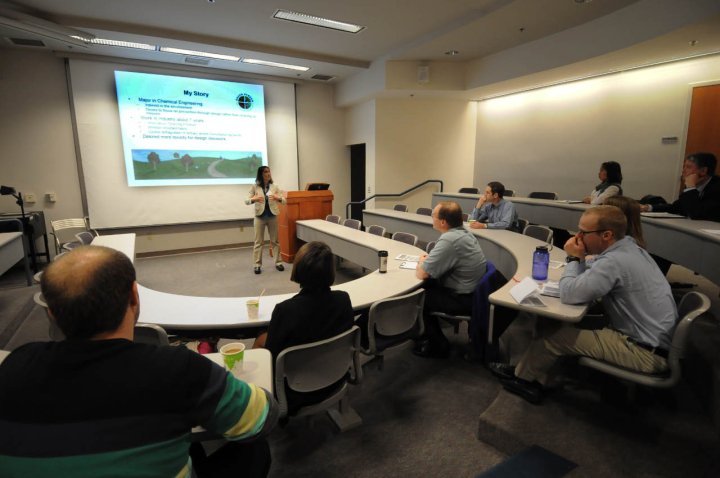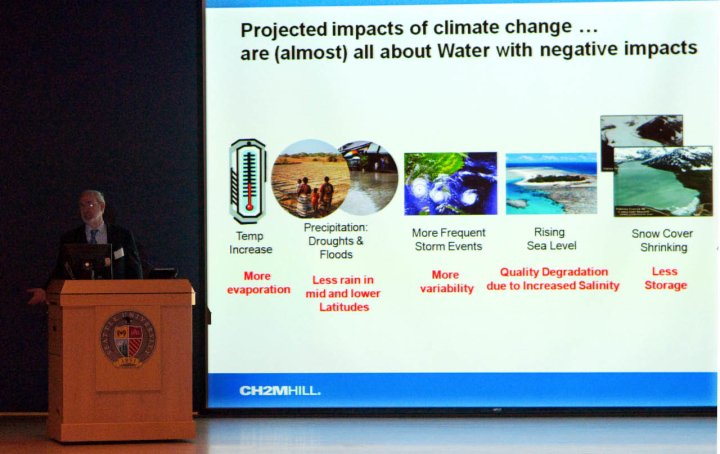A First Time for Everything
Last month, the local Puget Sound section of AIChE, with help from other Washington state AIChE sections, organized the first event of its kind for the greater Pacific Northwest region (get ready for a mouthful):
The AIChE Institute for Sustainability (IfS) First Regional Conference on Sustainability and the Environment for the Pacific Northwest. The name already gives away everything--it's about sustainability, it's for the Pacific Northwest and it was sponsored by IfS. What was unanticipated, however, was the number of speakers who came to Seattle for the event (more than 45) and the nation-wide representation (participants came from nearly 10 different states, from as far away as Hawaii and Delaware). What ensued was a unique experience combining engineering and policy, regional topics and ethics, scientists and businessmen. Though I was on the planning end, I did get to sit in on my fair share of sessions.

Discussions in Progress at The AIChE Institute for Sustainability (IfS) First Regional Conference on Sustainability and the Environment for the Pacific Northwest
The Question of Regulating Sustainability
One speaker I particularly enjoyed was Mark Morford, attorney at Stoel Rives LLP in Portland, Oregon. I was first introduced to Mark through his article in The Oregon Insider: "
Sustainability Regulation". Mark has since written a second article, "
Steps Toward Net Environmental Benefit in Agency Decisions," also from The Oregon Insider. The motivation for Mark's investigation of this topic on sustainability in legal or regulatory settings is stated in his February article:
"For decades, regulated entities (sources) have complained about the cost of complying with regulations that include seemingly illogical requirements to consume large amounts of limited natural resources and create more waste and pollution in the pursuit of singular environmental goals."
He cites the
Clean Air Act and
Clean Water Act as examples, and his work culminates in his latest article in which he describes weighing environmental values, wherein "Ecological Services" are pinned against protecting "Public Health." This comparison leads to net environmental benefit assessments--for chemical engineers, this should be old hat: like a mass or energy balance, we should be able to understand whether what we input to our "system" leads to a favorable output (or, at a minimum, understand and predict the output). But when earth's ecology and our definition of and standards for sound human health factor into the equation, we get to a bit of a moral quandary...
If We Don't Regulate it, it Must Be Ethical
What interested me about Mark's talk and this topic was the relationship of sustainability to ethics (thank you, environmental law)--fittingly, the close of the conference ended on Friday night with a banquet featuring keynote speaker John

Sessions in Progress
Dienhart, The Frank Shrontz Chair for Professional Ethics at
Seattle University. His talk was titled: "Is the Sustainability Movement Sustainable?" John grouped together history's underlying causes for change among: religion (today, including
NGOs); government; and business. For a topic that encompasses so many different fields and disciplines and can virtually apply to anything, a conversation about sustainability rightly deserves a large focus on its ethics angle.
Chemical engineers are always held to high ethical standards when designing, managing or overseeing technical projects at work. I would argue that it should be a simple and analogous act to apply that same professional, conscientious attitude towards our technical work to our stewardship of the environment and proliferation of sustainability.
The very principals of chemical engineering tend to focus on optimization: in my opinion, reducing the amount of raw materials for feedstock, minimizing waste and preserving natural resources as a result only makes for sound engineering practices. By reducing, reusing and recycling, we should have more with which to "make" (manufacture, produce, build, create) invariably. Thus, these practices become an ethical problem when ignored and, I argue further, must indubitably require us to acknowledge sustainability in some form through our own chemical engineering
Code of Ethics.
As we enter this philosophical realm, let us remind ourselves that there is no wrong answer, so please voice your opinion!
Photos Courtesy of fellow AIChE Member and Conference Attendee Scott Butner (http://www.flickr.com/rs_butner/)
Related articles by Zemanta
 Discussions in Progress at The AIChE Institute for Sustainability (IfS) First Regional Conference on Sustainability and the Environment for the Pacific Northwest
Discussions in Progress at The AIChE Institute for Sustainability (IfS) First Regional Conference on Sustainability and the Environment for the Pacific Northwest
 Sessions in Progress
Dienhart, The Frank Shrontz Chair for Professional Ethics at Seattle University. His talk was titled: "Is the Sustainability Movement Sustainable?" John grouped together history's underlying causes for change among: religion (today, including NGOs); government; and business. For a topic that encompasses so many different fields and disciplines and can virtually apply to anything, a conversation about sustainability rightly deserves a large focus on its ethics angle.
Chemical engineers are always held to high ethical standards when designing, managing or overseeing technical projects at work. I would argue that it should be a simple and analogous act to apply that same professional, conscientious attitude towards our technical work to our stewardship of the environment and proliferation of sustainability.
The very principals of chemical engineering tend to focus on optimization: in my opinion, reducing the amount of raw materials for feedstock, minimizing waste and preserving natural resources as a result only makes for sound engineering practices. By reducing, reusing and recycling, we should have more with which to "make" (manufacture, produce, build, create) invariably. Thus, these practices become an ethical problem when ignored and, I argue further, must indubitably require us to acknowledge sustainability in some form through our own chemical engineering Code of Ethics.
Sessions in Progress
Dienhart, The Frank Shrontz Chair for Professional Ethics at Seattle University. His talk was titled: "Is the Sustainability Movement Sustainable?" John grouped together history's underlying causes for change among: religion (today, including NGOs); government; and business. For a topic that encompasses so many different fields and disciplines and can virtually apply to anything, a conversation about sustainability rightly deserves a large focus on its ethics angle.
Chemical engineers are always held to high ethical standards when designing, managing or overseeing technical projects at work. I would argue that it should be a simple and analogous act to apply that same professional, conscientious attitude towards our technical work to our stewardship of the environment and proliferation of sustainability.
The very principals of chemical engineering tend to focus on optimization: in my opinion, reducing the amount of raw materials for feedstock, minimizing waste and preserving natural resources as a result only makes for sound engineering practices. By reducing, reusing and recycling, we should have more with which to "make" (manufacture, produce, build, create) invariably. Thus, these practices become an ethical problem when ignored and, I argue further, must indubitably require us to acknowledge sustainability in some form through our own chemical engineering Code of Ethics.







